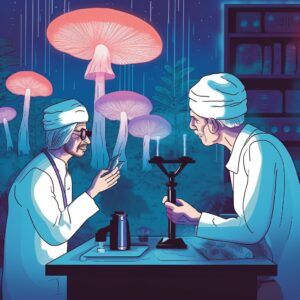Psychedelics, also known as hallucinogens, have been used for thousands of years in spiritual and ceremonial practices. However, in the 1960s, due to their association with the counterculture movement and reports of adverse effects, psychedelic substances were criminalized and became highly stigmatized. In recent years, there has been a resurgence of interest in the therapeutic potential of psychedelics for a variety of mental health conditions, including depression, anxiety, addiction, and PTSD.
One of the most promising areas of research has been the use of psilocybin, the active ingredient in magic mushrooms, for the treatment of depression. In a 2016 study published in the Journal of Psychopharmacology, researchers found that a single dose of psilocybin produced significant reductions in depression and anxiety in patients with life-threatening cancer. Another study published in the same journal in 2020 found that psilocybin therapy was effective in treating treatment-resistant depression.
 Similarly, research has shown that MDMA, commonly known as ecstasy, can be effective in treating PTSD. In a 2016 study published in the Journal of Psychopharmacology, researchers found that MDMA-assisted therapy produced significant reductions in PTSD symptoms in a group of veterans, firefighters, and police officers. Another study published in the same journal in 2021 found that MDMA-assisted therapy was more effective than traditional psychotherapy in reducing PTSD symptoms in a group of military veterans.
Similarly, research has shown that MDMA, commonly known as ecstasy, can be effective in treating PTSD. In a 2016 study published in the Journal of Psychopharmacology, researchers found that MDMA-assisted therapy produced significant reductions in PTSD symptoms in a group of veterans, firefighters, and police officers. Another study published in the same journal in 2021 found that MDMA-assisted therapy was more effective than traditional psychotherapy in reducing PTSD symptoms in a group of military veterans.
The therapeutic potential of psychedelics is thought to be due to their ability to produce profound alterations in perception, mood, and thought patterns. These altered states of consciousness can help individuals gain new perspectives on their lives and experiences, which can lead to lasting changes in behavior and emotional well-being. Additionally, psychedelics have been found to increase the connectivity and communication between different regions of the brain, which may contribute to their therapeutic effects.
While the research on psychedelics is still in its early stages, the results so far have been promising. However, it is important to note that these substances can have adverse effects, particularly in individuals with a history of mental illness or in those who use them recreationally. As such, any therapeutic use of psychedelics should be conducted under the supervision of a trained healthcare professional in a controlled setting.
In conclusion, the resurgence of interest in the therapeutic potential of psychedelics for mental health conditions is a promising development in modern medicine. While there is still much research to be done, the results so far suggest that psychedelics may be a valuable tool in the treatment of depression, anxiety, addiction, and PTSD. However, it is important to proceed with caution and ensure that any therapeutic use of these substances is conducted in a safe and controlled manner.


0 Comments